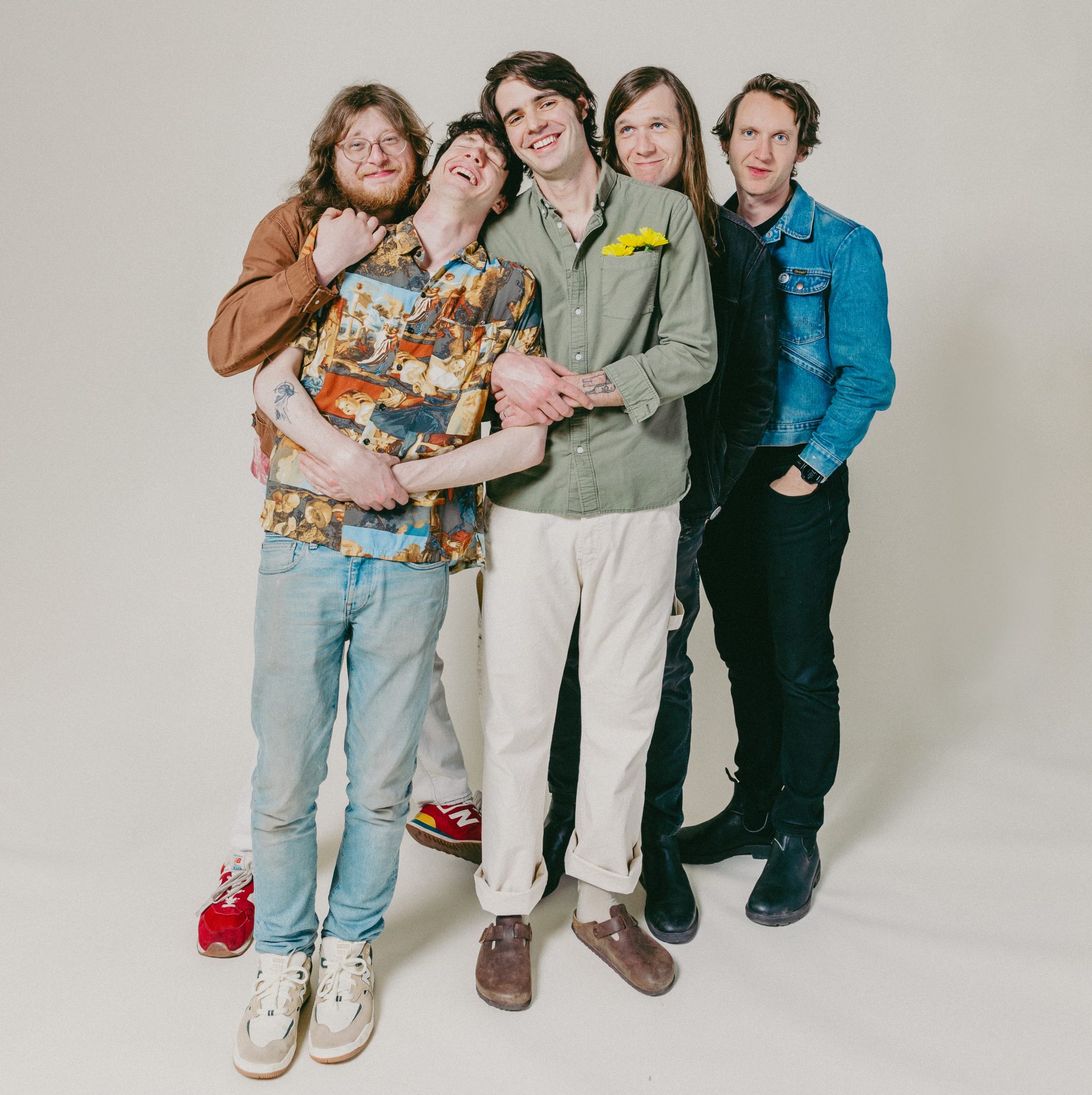
Slaughter Beach, Dog are still growing up
Jake Ewald’s stories are almost never true. Not completely. As the primary songwriter and frontman for Slaughter Beach, Dog, Ewald is consistent in his ability to refract his life through the prism of experience outside of his own, to whisper down the lane that is collective existence until observation becomes its own form of empathy.
There are times, though, when the membranes thin and a little more of the truth is allowed to shine through; a quiet show in a packed church in Philadelphia, the moment the wheels start to rattle as you and your band turn down the homestretch of an eight-minute single, when an icon and hero calls to talk about your oldest lyrics. Ewald does his best to see these flashes for what they are: a deep breath, joy, a moment to recede. His music has always tried to grapple with the entirety of experience, and, as its name suggests, Crying, Laughing, Waving, Smiling is no different, but there’s a little less control this time around, a little more trust, leading to some of the best songs Slaughter Beach, Dog have ever produced.
Read more: 10 songs that influenced Slow Pulp’s Yard
Ewald’s story begins back in the early part of last decade, when he and Bren Lukens started Modern Baseball, a totem of 2010s emo that, among other things, helped birth the Philadelphia label Lame-O Records and establish the city as a hotbed of DIY success. Sports remains the high point of that part of Ewald’s career, a heartfelt, wordy, and tightly coiled album that continues to find new fans a decade on.
Right around the time Modern Baseball called it quits, Ewald began releasing music as Slaughter Beach, Dog (an homage to the Delaware shore point of the same name). This marked not only a change of name for Ewald but a fairly distinct difference in the kind of songwriting he was interested in. Where Modern Baseball are all frayed nerve endings and late-night confessions, Slaughter Beach, Dog displayed more direct literary ambitions, his first LP taking the form of a pseudo-concert record. “I had literally only ever written songs about things that had happened to me,” Ewald told Atwood Magazine a couple of years back. “When I wrote the songs on Welcome, it was definitely an exercise in creating a universe and inhabiting that universe. It was kind of like a challenge that I set for myself.”
When I spoke with Ewald recently over Zoom, we talked a lot about this kind of shifting perspective, and how important it is to him both within his own work and the art and storytelling he best responds to. “By writing from different perspectives, I just make a lot of personal discoveries because I'm forcing myself to think in a way that I would not normally think,” he says. Of course, even that has shifted over time. His approach may be less direct on early Slaughter Beach, Dog records like Welcome and Birdie, but they were rooted in the kind of experiences a young man living in a city like Philadelphia might encounter. “My friends don't need jobs/‘Cause they all sell drugs/And spend their Fridays setting fire with their college degrees,” Ewald sings on Welcome cut “Jobs.” Birdie standout “Acolyte” picks at similar scabs (“Man, it cuts like a dull knife/When you’re young and you’re told/“It makes sense when you’re older”/Darling, let’s get old”).
2019’s Safe And Also No Fear marks a turning point in that regard. Not only do Slaughter Beach, Dog sand down the punkier edges of their sound, but they are intent on mining darker corners of their psyche. “I remembered that around the time of SAANF, I was obsessed with the idea of Serious Art, and being perceived as a serious artist who could tell serious stories,” Ewald wrote recently in his newsletter Pause For Effect. Songs like “Black Oak,” a nearly seven-minute murder ballad, are quite far from the jilted lovers and lonely losers of his work on Modern Baseball, stretching outside of personal experience for something grander. That said, Ewald can’t help but laugh a bit at all that self-serious gloom. While he certainly doesn’t disown any of those songs, he does look at things a little differently now, aiming to blend emotional depth with something more natural on Crying, Laughing, Waving, Smiling. “We were able to express ourselves in a way that didn't feel contrived or like we were trying to climb Mount Everest,” he says.
I first got a chance to hear a good chunk of the record last December when Ewald played an acoustic show alongside bandmate Adam Meisterhans at First Unitarian Church, a Philadelphia venue of much regard. In that space, with its lined pews, soft lighting, and vast sound, the songs came across as just that: natural, unaffected, and, at times, genuinely funny. “Sister In Jesus Christ”’s many asides include meathead baseball players, BDSM, My Chemical Romance shirts, and a cheddar and spinach omelet, its jaunty flow perfectly in step with its subject matter. Also evident during this hour-plus set was how much that laid-back sound comes from Ewald’s always-shifting listening habits.
The days of basement shows and sweaty mosh pits might not be fully behind him, but he is certainly welcoming a rootsier, more homespun palette into the band’s sound. Covering both Townes Van Zandt and Blaze Foley, pillars of outlaw country, might not be something you can imagine from Modern Baseball but very much feels like the logical evolution for this version of Slaughter Beach, Dog. If their excellent 2020 record, At The Moonbase, was their boozy, Stones-inspired romp, this is their exploration of what happens when John Wesley Harding meets Lucinda Williams. This is heard most readily in a song like “Summer Windows,” a lazy, finger-picked stroll down the alleys of regret and longing. “I felt like I was finally beginning to understand the melodic and lyrical phrasing that is more in line with a lot of the folk-rock and country stuff that I was listening to,” Ewald says. “I had been internalizing those forms a lot more than I realized.”
This progression is not only logical but, when you think about it, pretty inevitable. Sure, you can tell stories within every musical framework, but when considering the arc of Ewald’s career, you can’t imagine it ending up anywhere but alongside these folky masters of the vignette. “My favorite thing about trying to write from different perspectives is that it creates the opportunity for surprise,” Ewald says when our discussion once again turned toward the importance he places on finding new ways into the human experience. “The coolest part is that whenever it clicks, and I’m deep enough in the world, I might stumble upon something that I would not have thought of.”
Ewald’s goal might have been to find a way out of his own head lyrically, but, whether he meant to or not, this largely extended to the record musically as well. There is, to put it bluntly, less Ewald on this record than any other in the band’s catalog. He will always be a verbose songwriter, but there are far more instances of him receding into the background than ever before. And it makes sense. At The Moonbase was, by and large, a solo endeavor, made during COVID-19 and written and recorded mostly by himself. Perhaps due to the circumstances, this was also his most micro-managed pursuit. Ewald would record and re-record in search of perfection in a way that became exhausting.

Ashley Gellman
The reins were loosened significantly this time around, lending itself to the ramshackle sound the band were able to produce. “A lot of times when I’ve made records, it felt like trying to put together a puzzle or do math,” Ewald says. “This one just felt way more comfortable. We just settled into this groove that was more relaxed and more open and free in a lot of ways.” When asked how he, as the leader of the band, can work to create this atmosphere, he gives an answer that is revelatory in its simplicity. “The way for me to encourage that was to just sit back and let everything happen. It's a humbling thing to realize that if I just shut up for five minutes, they can make something really, really good.”
Ewald may be downplaying his own contributions, but it is important to note how incredible his band sounds playing behind him. Part of that is familiarity. Bassist Ian Farmer has been playing with Ewald since Modern Baseball days, and multi-instrumentalist Zack Robbins, keyboardist Logan Roth, and guitarist Meisterhans seem perfectly in tune with what Ewald is reaching for. Then there’s the newcomer, vocalist Erin Rae, who is, in her own right, a wonderful songwriter and contributes backing vocals and harmonies to nearly every song on Crying, Laughing, Waving, Smiling.
Ewald always knew he wanted another vocalist on the record, and when Meisterhans introduced him and Rae, the match felt pretty perfect. “It was a total breeze, and I feel like she really tied the record together in a cool way,” Ewald says, who seems blown away by the ease of the whole process. “I didn't even have specific things I wanted Erin to do, but I had a feeling that she would have the right ideas.” Even as a relative outsider, Rae was taken aback by how laid back the recording atmosphere was. “Their studio space is so cool. I think that made such a difference, how comfortable and relaxed it all was,” says Rae. This all comes together on a song like “Float Away,” the catchiest song on the record and one of the best the band’s ever written. It’s the kind of simple, timeless tune you can imagine wafting from highway-bound car windows or snaking its way through patio furniture for years to come, and it's not something Slaughter Beach, Dog could have written before now.
“Every record is about growing up — we all have to get a little older before we make the next one.” Those are the words of Craig Finn, songwriter and frontman for the Hold Steady, and they come at the end of the bio he wrote for Crying, Laughing, Waving, Smiling. Ewald still can’t quite believe how this all came to pass. He’s been a fan of Finn and his songwriting for years, but it was upon hearing that the feeling was mutual that Ewald thought he might be interested in writing something about Crying, Laughing, Waving, Smiling. What resulted is a winding, conversational exploration of what it means to be a distinct songwriter in a band, something they both know a lot about.
I asked Ewald specifically about the idea of growing up and whether he considered this record a testament to the growth of him and his band. He said he hadn’t, really, till he read those words from Finn, but identifies one specific moment that could have never happened if not for the years the band have spent together. Crying, Laughing, Waving, Smiling is anchored by “Engine,” a nearly nine-minute song that weaves stories of stolen vans, endless tours, and existential angst among sun-cracked guitar solos and honey-slide jam-outs.
Ewald’s initial demo for the song was barely half that length, but each time they played it, the band let it stretch and breathe. They found new life in the glove box and inspiration stuffed between the seats, relinquishing control, easing the foot off the break. “It's an amazing reminder of the things that you can do with music,” Ewald says. “And the only reason it exists the way that it does now is because we let it come into its own. You have to create the kind of vessel for it to live inside of — you have to make that space for it.” If Crying, Laughing, Waving, Smiling is that vessel, Slaughter Beach, Dog have filled it to the brim.










